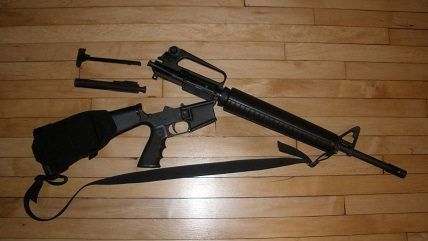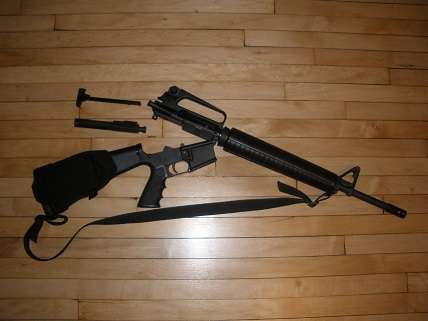Militarizing Public School Security: Classroom Cops Will Have AR-15s
Without better guns, school cops just aren't prepared for terrorist attacks, mass shootings, meteor strikes, etc.


When students in the Compton Unified School District in California return to class after summer break is over, they may be surprised to find that the campus police officers are prepared for all-out war. Over the summer, the district's school board authorized the school police to beef up their arsenals by purchasing semi-automatic weapons.
Compton isn't even the first public school district to do so; a dozen others have instructed the cops to buy SWAT-style weaponry, according to ABC-7:
"I was extremely opposed to the police officers having rifles; however, the statistics are chilling," said Satra Zurita, Compton Unified School District Board member.
The Compton School Board's approval of the AR-15 for school police in July was unanimous. They are not alone. LAUSD tells Eyewitness News they have comparable weapons. So do Fontana School Police. The numbers are growing.
What were those statistics? School Police Chief William Wu explained to district officials that some mass shooters wear body armor (a whopping 5 percent!), and cops have to get within 25 yards of their target to take anyone down with mere handguns. Therefore, they need AR-15s. Without better guns, school cops just aren't prepared for terrorist attacks, mass shootings, meteor strikes, etc.
Never mind, of course, that despite random fluctuations from year to year, mass shootings are not becoming more frequent or more deadly, and schools are among the safest places for kids, all things considered. It would seem to me, then, that Compton is preparing for an exceedingly unlikely worst case scenario.
Is there any harm in being prepared, anyway? Some members of the school community certainly seem to think so, according to 89.3 KPCC (emphasis mine):
But some community members are upset about the policy, questioning the utility of having such high-powered firearms in the hands of school police officers.
"The school police has been very notorious in the community and in reality has never had to shoot anyone before," said Francisco Orozco, a recent Dominguez High School graduate and founder of the Compton Democratic Club. "So this escalation of weapons we feel is very unnecessary."
Orozco said the police could better focus on day-to-day security concerns on campus, rather than arming themselves for a worst-case scenario. He also pointed to a lawsuit filed last year by parents in the district, alleging racial profiling by Compton school police officers — as well as recent allegations by students of excessive force — as evidence of a rift between the department and the community.
"The school police has not even earned the right to carry handguns," Orozco said.
As the recent events in Ferguson have made clear, a more militarized police force damages the relationship between the cops and the community. If the people already don't trust the cops, arming them to high heaven certainly won't help matters.
Wu defended the new weapons policy as an "effective tool" to confront threats to students' lives:
It is a worst-case scenario, and SWAT teams train for it: an active shooter storming a school, a gunman armed with high-power weapons and wearing body armor.
"Seeing in the North Hollywood shootings when they were wearing the soft body armor, bullets were hitting them but having no effect in slowing them down," said Wu.
And it can take time for a fully equipped SWAT team to get to a school.
"Any extra 30 seconds, one minute, two minutes that we can't stop the threat exposes our kids to more unreasonable danger," said Wu.
District policy will require the cops to store their new weapons in their vehicles, however, so in the event of a shooting, the officers would still have to take a few minutes to retrieve the rifles.
If such new security measures are actually necessary, Wu hasn't made a very strong case. Just because something bad could happen—even though it's astronomically unlikely—is not reason enough.
In any case, those who oppose the creeping militarization of the police certainly have their work cut out for them, if even security officers in extremely safe school environments are geared for battle.


Show Comments (72)